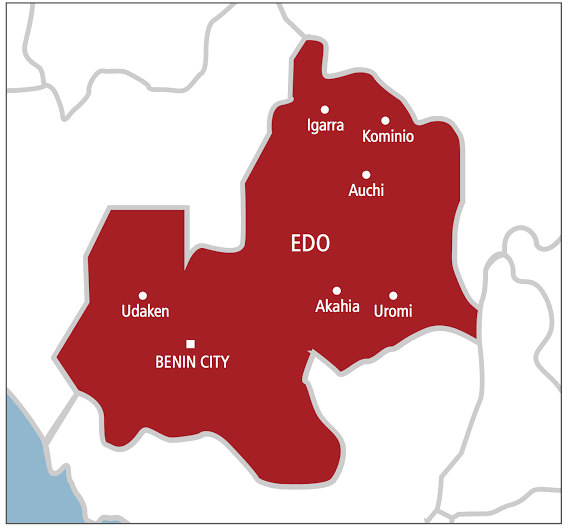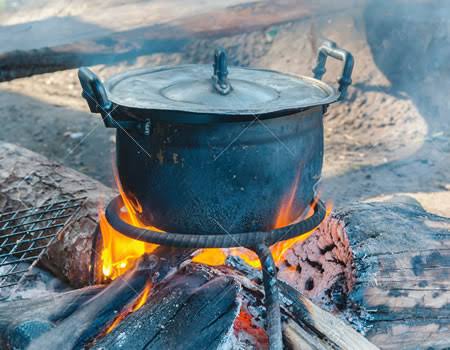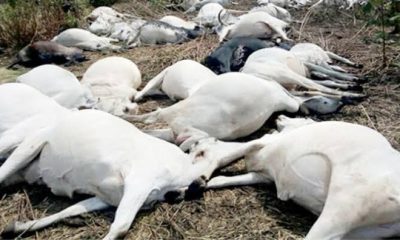Feature
Who will rescue Edo from the grip of cultists?

Who will rescue Edo from the grip of cultists?
By Usman Aliyu
In recent times Edo has been grappling with a surge in cult-related violence leading to loss of lives and a pervasive sense of insecurity among its residents.
Over the past month alone, the state has witnessed the tragic loss of more than 35 persons, including a journalist and a prominent head of a security network.
These incidents have sent shockwaves through the state, raising prompting calls for effective measures to address the escalating challenge.
The increase in cult clashes in this state, particularly the capital, in Benin, raises serious concerns as residents are understandably fearful for their safety.
The brazen nature of the attacks attacks has instilled unease and vulnerability among residents.
The impact of these heinous acts extends beyond the immediate loss of life, as it also disrupts the normalcy of everyday life, leaving communities in a constant state of apprehension and distress.
Media reports indicated that no fewer than 30 persons lost their lives in early part of January in a wave of attacks and reprisal attacks between Black Axe and rivals, Supreme Eiye Confraternity around 2nd East Circular area of Benin,
Another clash between the two fierce rival groups resulted in the death of three persons, according to media reports.
Two of the latest victims simply identified as Denco and Ariba were allegedly killed at a drinking joint at Igun junction between Igbesanmwan and Oza Street, off Sokponba Road in Benin, the reports further said.
The menace is restricted to Benin as media reports show that the killings spread across the state.
A tally published by a national daily revealed that Benin City leads the pack with 97 deaths.
It is followed by Ogbegbe with 31; Ewu-Esan Local Government Areas with no fewer than 13 persons; Egbeta with three deaths; and Ekpoma with two deaths.
According to report, other 34 deaths are spread across several other local government areas in the state.
“The issue of incessant cult killings in the state is really worrisome. The security agencies and the state government should do something urgent about it.
“I remember that in a security summit organised by the state government in 2023, Gov. Godwin Obaseki said his government was putting necessary machineries in place to curtail insecurity in the state.
“He should as a matter of urgency declare a state of emergency on insecurity especially on cultism,” says Umar Idris-Momoh, a Benin resident.
It’s not only Idris-Momoh that is worried, Mrs Esther Idahosa, a business owner whose residence is on the Ekhewan road of the city describes as devastating, the high rate of killings from the renewed attacks which began in December.
Since then, she said, the state has been thrown into a palpable fear and expressed worries that even the innocent, who are non-cult members, are being caught in the cross fire of rival cultists.
“There are cases where family members and neighbours of rival groups’ members are killed simply because they could not find their targets. This is disturbing.
“It is becoming too much in the state, particularly Benin City. There is an urgent need for action from the authorities to restore peace and order,” she says.
Corroborating the call for an immediate action, Mr Tunde Osakwe, a community leader, says night life in Benin is now full of fear, frustration and anxiety.
“They can attack anytime and anywhere. One of the attacks in December was at a place very close to a police station.
“What can be more daring than this,” asked the community leader.
As security agencies and other stakeholders assess the situation, it becomes evident that the prevalence of cult-related violence, poses a grave threat to the peace and stability of the state.
The intricate network of cultism, characterised by rivalries, is also undermining the social fabric of the state.
The implications of this are far-reaching, affecting the economic and psychological well-being of the entire community.
Acknowledging this fact, Obaseki, while receiving the newly deployed Commandant of Nigerian Security and Civil Defence Corps (NSCDC) to the state, Mr Gbenga Agun, said cultism remains one of the biggest security challenges in the State.
Though he says his administration is reviewing existing laws to ensure proper prosecution of offenders, the governor solicited collaboration amongst the security agencies as one of the strategies to combat it.
“Cultism is one of the biggest challenges we face in the state and it involves abuse of drugs and we are working on strategies to deal with the issue.
“Working with your men and other agencies, we believe that the plan we have in place will make significant progress in the fight against cultism.
“We are working with the Edo State House of Assembly (EDHA) to update the laws to make it more effective.
“It will enable us to deal with the issue and those causing us problems in the State,” said Obaseki, the Chief Security Officer of the state.
Similarly, the Commissioner of Police in the state, Mr Funsho Adegboye, expressed worries on the exacerbating cult killings as well as the proliferation of firearms in the state.
He assures the public, however, that the police would deploy every means within the law to curtail the conundrum.
The police chief, who assumed duty in the state at the height of the attacks, also acknowledged that the issue of cultism is worrisome.
The top notch of Nigeria Police Force is equally worried.
“We want to assure members of the public, starting from His Excellency, the Executive Governor of Edo State; we have gotten assurances from him and the Inspector-General of Police, IGP, Kayode Egbetokun.
“Godwin Obaseki has given us a kind of umbrella backing that whoever we get, not minding where he/she belongs to, that the person should be arrested and we should follow the processes of the law”, said the police chief.
Nevertheless, he appealed to parents and guardians to warn their children and wards against any action that could affect the peace of the state.
The escalating wave of this violence represents a critical challenge that demands urgent attention and concerted action.
To effectively address the scourge, concerted efforts and comprehensive strategies are essential.
By implementing a comprehensive strategy that combines effective law enforcement, community engagement, social interventions, and economic development, it is possible to stem the tide of cult violence and pave the way for a safer, more secure, and harmonious Edo.
The time to free Edo from the grip of cultists is now.
Who will rescue Edo from the grip of cultists?
Feature
Pelumi Nubi’s London-to-Lagos journey and West Africa’s border realities

Pelumi Nubi’s London-to-Lagos journey and West Africa’s border realities
By Mark Longyen & Tosin Kolade
When travel content creator Pelumi Nubi embarked on her 68-day solo journey from London to Lagos a few months ago, little did anyone anticipate the beauty, excitement, and challenges that would unfold.
She embarked on a journey from London through France, Spain, and Morocco before venturing into the West Sahara Desert.
From there, she continued her expedition through Mauritania, Senegal, The Gambia, Guinea-Bissau, Guinea, Sierra Leone, Liberia, Mali, Burkina Faso, Côte d’Ivoire (Ivory Coast), Ghana, Togo, Benin, and on the other end arrived in Lagos, Nigeria on April 7.
Pelumi made history as the first black woman to complete a solo drive from the United Kingdom to Nigeria, garnering accolades and recognition worldwide for her remarkable achievement.
Fans greeted her arrival with cheers, having closely followed her journey online.
In recognition of her extraordinary feat, the Lagos State government bestowed upon her a new car, a house, and an ambassadorship for state tourism.
While the journey progressed, the solo trip revealed the beauty, culture, and traditions of all the countries she visited.
However, a major highlight was the difficulty and delay in moving past the West African borders as a British-Nigerian citizen with the required travel documents.
Different passport checks, attitudes of border security officers, and seemingly deliberate delays, were shown on her social media page, Instagram, with millions of viewers.
According to Pelumi, she hopes to use her platform to create an awareness campaign for improving freedom of movement for people in the African region.
Pelumi is not alone in the narrative about the frustrating and agonising road-travelling experiences on the borders of member states by ECOWAS citizens.
Doris Brown, Deputy Secretary-General, Lions Club District 40382, comprising Liberia, Sierra Leone, Ivory Coast, and Togo, who experienced the same, urged Customs and Immigration officers to treat ECOWAS citizens, who cross the sub-regional borders by road with dignity and respect.
Like Pelumi, she said that 29 of the club’s members, while traveling to Togo by road from Liberia through Ivory Coast, and Ghana for their district convention, were subjected to agonizing hours of delays due to relentless searches at checkpoints.
According to her, by the ECOWAS protocols, people should travel freely without taking a visa from member states, as ECOWAS Heads of State have signed the protocols, so people should not be treated “inhumanly as if we came from space.”
“ECOWAS needs to have a second look at the relationship between its member states, especially with the ordinary citizen who embark on a journey by road.
“Each member state needs to ensure security, but as ECOWAS citizens, they should be accorded some respect and dignity.
“These were not part of the dreams of the founding fathers of ECOWAS for the ECOWAS citizens and Africa as a whole. If we cannot be respected at our borders and ensure free movement, what is the reason for having ECOWAS?” Brown queried.
Critics say that in spite of the signing of the African Continental Free Trade Area (AfCFTA) and the ECOWAS protocol on the free movement of persons and goods, challenges persist regarding the free movement of people and goods in the West African sub-region.
The free trade agreement, brokered by the African Union (AU) and signed in Kigali, Rwanda on March 21, 2018, aims to establish a single market for goods and services in Africa, promote the free movement of people, and drive economic growth and development across the continent.
With 54 signatories, the AfCFTA is the largest free trade area by member states after the World Trade Organisation, encompassing over 1.3 billion people and vast geographic regions.
It envisions provisions for visa-free travel, residency rights, and the absence of movement barriers, enhancing economic integration and regional cooperation.
While policymakers see labour movement as crucial to the success of the continental free trade agreement, not all African countries fully support the idea.
Additionally, alongside the AfCFTA agreement and the Kigali Declaration, 30 African nations signed the Protocol on Free Movement of Persons, aiming to establish a visa-free zone within AfCFTA countries.
The ECOWAS protocol on the free movement of goods and people promotes regional integration and economic progress among its member states.
The Protocol on Free Movement, Right to Residency, and Establishment, mandates member-states to allow ECOWAS citizens with valid documents the right of entry into their territories under the provisions of the protocols.
ECOWAS member states are also required to adopt measures to ensure that ECOWAS citizens enjoy to the full the rights granted in the Protocol.
Dr Matthew Ogali, a researcher from the Department of Political and Administrative Studies at the University of Port Harcourt, highlighted one of the objectives of ECOWAS as promoting trade and commerce among member countries.
He identified various institutional and non-institutional barriers hindering the free movement of people and goods, such as excessive customs checks and entry restrictions.
According to him, after forty-nine years of existence, ECOWAS has primarily thrived in the informal trade sector, characterised by small-time entrepreneurs conducting business across borders with minimal adherence to established trade policies.
Ogali noted that this informal trade environment has also fostered criminal activities like smuggling and cross-border armed banditry, resulting in significant losses of goods and, at times, lives.
“Despite its resilience over the past forty-nine years, ECOWAS has struggled to translate many of the documents produced by its intellectual community, often seen as scholarly discourse, into practical policy implementations.
“This gap between academic insights and policymaking poses challenges for addressing the region’s problems effectively.
Prof. Charles Ukeje of the Department of International Relations, Obafemi Awolowo University, OAU, Ile-Ife, while commenting on Pelumi’s experience at the borders of ECOWAS countries, said her challenges may have been unrelated to any deficiencies in the ECOWAS protocol on the free movement of its citizens.
He said: “One would not know whether she was carrying a British passport or a Nigerian/ECOWAS passport during the trip, which would have guaranteed her free movement, or otherwise, within the subregion in line with the ECOWAS protocol.
“Also, we need to know whether the passport she carried had expired or was invalid at the time she was traveling, which may have necessitated scrutiny by security officials at the borders.”
Corroborating Prof. Ukeje’s view, ECOWAS Director, Free Movement of Persons and Immigation, Albert Siaw-Boateng, said that the delay experienced by Pelumi at the points of entry or exit could not be attributed to any weaknesses in the implementation of the protocol.
He said that due to the prevailing security challenges in the region, triggered by terrorism and violent extremism, ECOWAS’ security architecture necessitated thorough checks on travelers by security officials without impeding the free movement of community citizens within the region.
According to him, the protocol also gives room for National Laws to take precedence, hence, there are inconsistencies in the implementation of the protocol by individual member states.
“It is also to be noted that even though all member states have signed up to the Free Movement Protocol, it gives room for National Laws to take precedence.
“In this regard, there are inconsistencies in the implementation of the protocol by Member States.
“So, any delay at the point of entry or exit cannot be attributed to weaknesses in the implementation of the protocol,” he said.
Dr Omar Touray, President of the ECOWAS Commission, speaking on the Free Movement Protocol recently, noted that: “Free Trade moves with Free Movement of persons and goods.”
ECOWAS Commission Headquarters, Abuja.
Touray said that ECOWAS had been implementing joint border posts, which brought together border officials of two neighboring countries to carry out joint operations, to ease cross-border crossing, which sometimes took cognizance of respective member states’ laws.
“We have built a joint border between Nigeria and Benin at the Seme-Krake border, and between Togo and Ghana at the Noepe-Akanu border. These border posts are now operational.
“There is another border post that has been made operational between Nigeria and Cameroon at the Ekok-Mfun area. This was financed by the African Development Bank,” he said.
The creation of the ECOWAS protocol on the free movement of persons and goods on May 29, 1979, to facilitate a borderless ECOWAS, is a cardinal scheme of the bloc’s integration programme, aimed at moving from an ECOWAS of states to ECOWAS of people.
The Protocol adopts the removal of roadblocks and security checkpoints on intra-ECOWAS international highways, the introduction of a single ECOWAS passport, and a Schengen-type visa for the community’s citizens, among others.
Experts say this has fostered regional integration and development by boosting citizens’ mobility, which has yielded multi-sectoral benefits and contributed to key developments in the ECOWAS subregion.
They emphasise that effective policy implementation and addressing institutional barriers will fully realise the benefits of regional integration in West Africa.
Pelumi Nubi’s London-to-Lagos journey and West Africa’s border realities
Feature
THE BEAUTY OF CLASSMATE

THE BEAUTY OF CLASSMATE
By Dada Emmanuel Olayinka
- Classmates Are Family.
- Avoid Things That Divide Family.
- In Class You Would Always Be ABUBAKAR, EMEKA and ADEWALE etc Despite the PhD, SAN, Hon, Chief, General, Prof, Mr, Dr, Rev, Ustaz etc.
- Check On, Reach Out To Classmates Who May Be Less Successful.
- Achievements Are Processes Not Destination; Everyone Has His Time.
- Class Groups Are Not Places For Intimidation But Co-operation.
- Classmates Are Not Political Or Cabal Groups
- Be Humble and Sincere With your Classmates, They Knew You When You were Nobody.
- A United Class Is a Successful Class, No Matter Who Succeeds First.
- Never Treat Classmates Like Employees..
- Be Kind To Classmates, Table Can Turn in Future.
- 💰 Money Can’t Buy You Classmates’ Support When You are In Trouble.
- Forgive Classmates’ Mistakes ,They are Human.
Many years ago I was working as a clerk at a faculty in one popular university in Nigeria, then I saw an advert for NDA (Nigeria Defence Academy), I have always loved to go to NDA so I applied, submitted my form and was called for admission examination.
Read Also: Defence Ministry Inaugurates Committee To Review Veterans Federation Bill
I had to travel to Kaduna all the way from Osun State, I have a distant uncle that was resident there then. I wrote a letter (no telephone at the time) to my uncle that I was coming to sit for an exam in Kaduna and would love to stay in their house.
I didn’t get a reply to my letter even as my departure date was approaching. I became so worried because I needed to go anyway, as I was talking to a colleague in the office concerning my fear of where to stay, our office cleaner who was a Hausa man overheard us and in his broken English interjected that he knew someone right inside NDA.
Who could he know there? Is it not a cleaner like himself, I unintentionally said it out to his hearing. “Oga no o, the commandant op za NDA na ma classmate and ma priend”. In his bad handwriting, he scribbled the commandant’s name on a piece of paper. “Just mention my name’s por am, him go helf you.”
I reluctantly collected the paper from him, not because I intended to make use of it but because I didn’t want him to feel bad.
The next day, I set out on this long journey by train from Osogbo. I got to Kaduna a day later towards evening. Upon getting there, I went straight to my uncle’s house only to find out that they had relocated from that place and no one knew their new address. I became stranded and it was getting late.
Around after 7pm, I made up my mind to give my cleaner’s contact a shot. I got to the gate of NDA and mentioned the name I was given. To my utmost surprise, everyone in that bit, recognized the name and one person was promptly detailed to take me to his office.
I gave the paper where Kabiru wrote his name and that of his friend to the secretary who took it inside. On sighting the paper, the commandant shouted from the office and followed the secretary outside to usher me in. “Where do you know Kabiru?” “He’s my colleague in the office, Sir,” I answered.
“Where is he? How is he? Hope he’s doing well?” This man was asking me many questions in an obvious excitement.
The look on his face confirmed to me that Kabiru was his beloved friend. He asked me what I came to do in Kaduna and I said it was for the NDA exams. “Wow, do you have where to sleep?” “No, sir.” He immediately called someone to take me to his house. On getting to the house, I was lavishly entertained.
This man came late in the night and he woke me up and took me up on tutorials for the next day’s exams. After the exams, he personally drove me to the park the next day.
When I got back to the campus, I began to look at Kabiru with a different eyes. How on earth does this man know such a powerful person? Needless to say, my name was number four on the list when the results came out.
Friends, I put it to you today that relationship is a currency. Every man needs another man to move up and that man may be the neighbour you look down on, maybe the taxi driver you so despise or even the house help you think is a nobody today.
Relationship is a stream of income. Everything in life actually reproduces on the basis of relationship. Those we know in life matter. Most of us are talented but we need a cupbearer that will tell Pharaoh that there’s a Joseph that can interpret dreams. we need our old school mates irrespective of their status today.
Hook up with your class mates in the primary, secondary and tertiary schools alumni.
There are some heights you may never get to in life until someone tells someone about you even in church or mosque. Therefore, shut the door on relationships gently. You may need to use it tomorrow.
Let us take our relationships seriously. Even if you meet onoline, don’t look down on anyone. You never can tell which of the relationships will be your own key to success
THE BEAUTY OF CLASSMATE
Feature
Nigerians return to charcoal stoves, firewood and matters arising

Nigerians return to charcoal stoves, firewood and matters arising
By Tosin Kolade
“Our ‘Joko’ charcoal stoves are a must-have for everyone. Easy to use; cook faster; use less charcoal and super durable.
“Because of its wall insulation, it concentrates all the generated heat onto the food that is cooking for even, and faster cooking.
“The big size sells for N21500, while the small size sells for N15,000, We are not taking online orders for now only store pickups”.
These and many more are what you find available at website of online store of a popular brand that sells locally-fabricated kitchen appliances.
Many of these brands use different catchphrases and advertising strategies as they hustle for customers in the fast growing charcoal stove market.
From using sponsored advertising campaigns online, the word of mouth and referrals, the advent of charcoal stoves and its acceptability among Nigerians cannot be underestimated.
Due to rising kerosene and cooking gas prices, a Mararaba resident, Hauwa Ladan says she has shifted to charcoal stoves and firewood as primary cooking fuels.
She finds charcoal stoves economical and faster for family meals, and has recommended it to friends and neighbours.
Ladan highlights the considerable impact of high cost of cooking gas, saying that it leaves huge holes in household expenditure in Nigeria.
“Nigerians should go back to charcoal. They believe gas cooks faster, whereas charcoal is better!
Read Also: In Photographs, Zulum Visits Qatar Charity Headquarters In Doha
“ There’s no cooking pot you place on charcoal that will go black. It’s only firewood that stains cooking pots’’, Mrs. Elizabeth Moyegun“, told a national daily recently.
The recent blame game by the Nigerian Association of Liquefied Petroleum Gas Marketers (NALPGAM) and LPG terminal owners for the high cooking gas prices underscores the complexities in the supply chain.
Industry watchers say such disputes may reveal challenges in distribution, storage, or pricing strategies.
Addressing these issues is crucial to stabilise and potentially lower cooking gas prices for consumers, the NALPGAM says.
President of the NALPGAM, Oladapo Olatunbosun, insists that liquefied petroleum gas, popularly called cooking gas, has risen to at least N1,300 per kilogramme.
Although charcoal and firewood may come handy in this period of expensive cooking gas, experts warn that it comes at a huge cost to the environment.
They come in the shape of deforestation, air pollution, degradation of ecosystems and other potential consequences.
According to a United Nations data, between 2005-2010, Nigeria experienced an annual loss of over 2 million hectares of forest, primarily due to agricultural expansion, logging, and infrastructure development.
Nigeria is a major consumer of fossil fuel for cooking, with over 120 million Nigerians relying on firewood and charcoal for their cooking needs, according to the International Energy Agency.
A report by National Bureau of Statistics (NBS), says cooking gas prices surged by 38 per cent, hitting ₦16,250 per 12.5kg cylinder in January 2024.
The NBS says there was a 3.55 per cent month-on-month increase in the average retail price for refilling a 5kg cylinder.
This surge in prices is accompanied by a 37 per cent increase in the price of 1kg of gas, which rose to ₦1,300 from ₦950 during the same period, the agency said.
Dr Temitope Oyetunji, a family health doctor in Abuja, said the use of firewood has dual impact on both users and the environment.
According to Oyetunji, the smoke from burning firewood poses health risks, leading to respiratory and heart diseases when inhaled.
He emphasised that the emitted smoke particles contribute to environmental pollution, impacting the ozone layer.
“The consistent use of firewood and other fossil fuels creates polluted air, affecting several Sustainable Development Goals (SDGs).
“They include SDG3 (Good Health and Well-being), SDG 7 (Affordable and clean energy), SDG 11 (sustainable cities and communities), and SDG 13 (climate action)”.
The World Health Organisation (WHO) points at fossil fuels, as major contributors to harmful emissions, significantly impact global health.
The WHO says 99 percent of the world’s population breathes air exceeding the organisation’s recommended quality limits, thereby posing threats to health.
Consequently, the WHO stresses the urgent need to reduce fossil fuel usage and implement tangible measures to alleviate air pollution.
Analysts say encouraging sustainable alternatives and efficient use of cooking gas could mitigate these environmental impacts and promote a healthier balance between energy needs and environmental conservation.
According to them, promoting sustainable practices, such as reforestation, efficient use of wood, and alternative energy sources, is essential to mitigate these environmental consequences.
An Environmentalist, Mr Newton Jibunoh, underscored the detrimental impact of tree felling for firewood in Nigeria, emphasising that it led to loss of biodiversity.
Jibunoh highlighted that deforestation significantly diminishes habitats for diverse plant and animal species, resulting in a notable decline in overall biodiversity.
According to him, the crucial role trees play in preventing soil erosion cannot be ignored, saying that their removal, as seen in the quest for firewood, can lead to diminished soil fertility and an increase in erosion rates.
He drew attention to the role of trees in absorbing carbon dioxide, noting that widespread removal of trees for firewood contributes to elevated levels of greenhouse gases, thereby exacerbating the challenges posed by climate change.
“The significance of trees in regulating water cycles cannot be underestimated, deforestation disrupts local hydrological patterns, potentially affecting water availability in the region.
“Many communities rely on forests for resources, as deforestation intensifies, these communities experience adverse effects on their livelihoods and cultural practices”.
Experts advocate a shift to sustainable cooking practices in Nigeria by addressing the escalating costs of traditional fuels like gas.
They opine that fostering collaboration and addressing supply chain issues could stabilise and lower cooking gas prices, benefiting both the economy and the environment.
They also propose reforestation and alternative energy adoption to mitigate environmental impacts.
Nigerians return to charcoal stoves, firewood and matters arising
-

 Education10 months ago
Education10 months agoMathematics Teacher Reportedly Stung By Bee While Preparing Students For Exam
-

 Health3 weeks ago
Health3 weeks agoOnly 58,000 doctors renewed licence out of 130,000 registered doctors – MDCN
-

 News1 year ago
News1 year ago3 escape death in Ore-Sagamu expressway accident
-

 Politics3 weeks ago
Politics3 weeks agoAPC IN A FIX AS GOVERNORSHIP ASPIRANTS REJECT THE ONDO STATE PRIMARY ELECTION RESULTS
-

 Crime2 weeks ago
Crime2 weeks agoPolice arrest cultists who killed rival in his daughter’s presence
-

 Sports2 weeks ago
Sports2 weeks agoAsaba to host Wheelchair Basketball Atlantic Conference League
-

 Education3 weeks ago
Education3 weeks agoUTME: JAMB to refund registration fees to deserving visually-impaired candidates
-

 News2 weeks ago
News2 weeks agoHow we rescued 40 poisoned cows from death – Official



Pingback: 2023: Inkblot dominates prime video most-watched movies - Ochuwa24 News Media
Pingback: Benue man set to marry three women same day